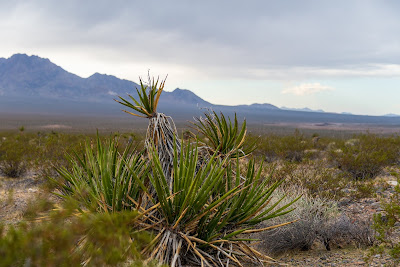The Sierra Club asked the California Energy Commission (CEC) to halt its review of K Road Sun's revised proposal to build the Calico Solar power project, but the CEC dismissed the Club's challenge. The project will destroy nearly 7 square miles of pristine desert on public land, and displace or kill many rare plant and wildlife species. As I mentioned in a
previous post, the CEC permitted the Calico Solar power project under a different owner last year, even though that company did not even have the financial or technical ability to build the project.
The new company, K Road Sun, is also of dubious pedigree, and is rushing the CEC for approval so that it can receive loans and grants from the taxpayer.
The Sierra Club told the
The Sun newspaper:
"The Sierra Club is very much in favor of renewable energy but this is a bad location ...," adding that the area is "important habitat for the desert tortoise and the big horn sheep."
The Sierra Club is not alone in opposing the destructive solar project. Defenders of Wildlife filed a brief in support of the Sierra Club's opposition. Also, BNSF Railroad opposes the project and filed a complaint with the CEC on Wednesday, according to the Daily Press. The company operates a rail line through the site and is concerned that glint and glare from the solar panels could blind its train engineers.
 |
| Prickly poppy and desert dandelions bloom on the site of the proposed Calico Solar power project in the central Mojave Desert. |
Why should California electricity customers and American taxpayers pay for K Road Sun's plans to destroy pristine desert habitat on public land? We need to cut greenhouse gas emissions, and increase renewable energy generation, but companies like K Road should not be given a free pass to destroy our natural resources when there are better places to put solar panels, such as rooftops and parking lots. In fact, a
CEC working group studying options to increase distributed generation reported in May that California's infrastructure is capable of more rooftop installations with relatively minimal hassle, which would spare our wildlands for future generations.



You may want to reconsider BNSF Railway's motivations for supporting your objections to the planned solar power generation facility. I doubt that safety concerns related to the engineers' visibility being adversely affected by glare is really the issue. BNSF is the major coal-hauling railroad in the U.S. For example, in the first nine months of 2009 coal was responsible for nearly half the tonnage moved by BNSF (214 billion revenue ton miles out of a total of 444 billion) and a quarter of the company's revenues ($2.7 billion out of a total of $10.4 billion). Since coal is used to generate electricity, any alternative, renewable electrical power generation method, such as a solar farm, is likely to affect BNSF's profits and perhaps that is the real issue here.
ReplyDeleteBNSF certainly has no track record (pun intended) of supporting environmental issues: consider their groundwater contamination in Washington and Idaho from a leaking fuel depot facility in Idaho and their recent destruction of prime wildlife habitat in Abo Canyon in New Mexico by their double-tracking it. The environment was certainly no concern in either of those.
Choose your alliances carefully. You may be only a pawn in a greater power play.
Thanks 29 Caddy. I do not have an alliance with BNSF, and I do not know much about their motivations beyond comments on the public record. Ideally the Sierra Club will see to it that the poorly sited Calico project is put to rest, but I will not complain if BNSF achieves the same goal. Ultimately, utility-scale solar on pristine desert is not a sustainable path for renewable energy generation, but local clean energy is.
ReplyDeleteI welcome your skepticism, though. The same could be applied to the motivations behind most "clean" energy companies...they have found a way to profit and win alliances with environmental groups, even though their business model involves the same landscape-scale ecological destruction that the other sources of energy cause.